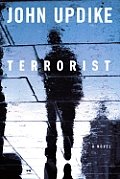Terrified by John Updike's new novel "Terrorist"

Like "Close to Shore" by Mike Capuzzo and the Jersey Shore and "the Informers" by Brett Easton Ellis and Los Angeles, "Terrorist" can scare the heck out of the reader (well, me at least) when read in the wrong locale. And, because fiction can often provide illumination in a way that fact cannot, living in America particularly NYC got a little scarier after reading this novel.
Ahmad, Updike's protagonist, is the teenage son of a poor, freethinking Irish-American mother and an absent Egyptian father. Perhaps in rebellion against his mother, a misguided means of connecting with the father who abandoned him or just in want of someplace he could belong, Ahmad turns to Islam. Unbeknownst to him and his mother, the mosque that he joins has terrorist connections. For seven years, Ahmad may have questioned the depth of his imam's faith and his interpretations of the Qur'an but he never suspected that the imam had ties to terrorism.
The imam sets the stage for Ahmad's seduction into terrorism by spinning verses from the Qur'an into reasonable sounding arguments. Although Ahmad's school counselor feels that he is a good candidate for college, the imam convinces him that an American university education will jeopardize his faith. Knowing what he does of college life, Ahmad believes him and follows the imam's suggestion to get a commercial driver's license (CDL) and pursue a career as a truck driver. Ahmad's mother doesn't have the money to pay for college tuition; so, she doesn't attempt to dissuade her son from his plans. Once Ahmad gets his CDL, he is offered a summer job delivering furniture for one of the imam's connections. The camaraderie Ahmad feels with his new coworkers, after years of feeling isolated, completes the seduction and leads him right into a starring role in a plot to blowup the Lincoln Tunnel.
If Ahmad's character had been born African-American, we wouldn't be shocked if he joined a gang. We wouldn't be shocked if then as a gang member, Ahmad went on to engage in activities that resulted in the destruction of property (graffiti, arson, collateral damage from gun fire, neighborhood disinvestment resulting from fear of the criminal element, etc.) and the loss of life (gang wars, drug deaths, innocent victims caught in the crossfire, etc.) we might be outraged or saddened but not shocked.
However, we are shocked when we read in the news about American citizens funding or joining terrorist organizations. But, is it really so shocking? I think the same underlying environmental and psychological causes that can attract an individual to a gang or cult would likely make them susceptible to joining a terrorist organization.
I also think that there are, here in America and obviously elsewhere throughout the world, sincere supporters of change in the Middle East... the true believers. After all, Irish-Americans funded Irish Republican Army (IRA) activities for decades. It's even an open secret that Irish-American elected officials used to host fundraisers in major American cities to help the IRA buy weapons. I'll concede that there is a difference between Irish terrorists firing guns in Northern Ireland and setting off bombs in England not in New York, but innocent civilians still lost their lives. Nevertheless, my point is that Americans, generations removed from Ireland and its conflicts, still identified enough with the IRA's cause to help pay for it.
It's not any literary technique to build suspense that makes "Terrorist" so frightening. It's the elucidation that the person in line behind you at the grocery store or next to you in traffic in the Lincoln Tunnel could be a terrorist and that you would have no way of knowing.


0 Comments:
Post a Comment
<< Home